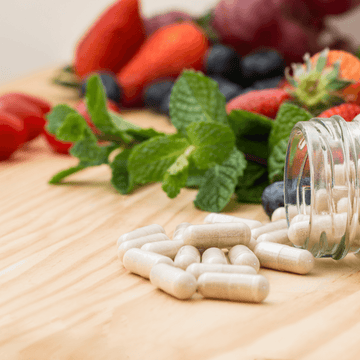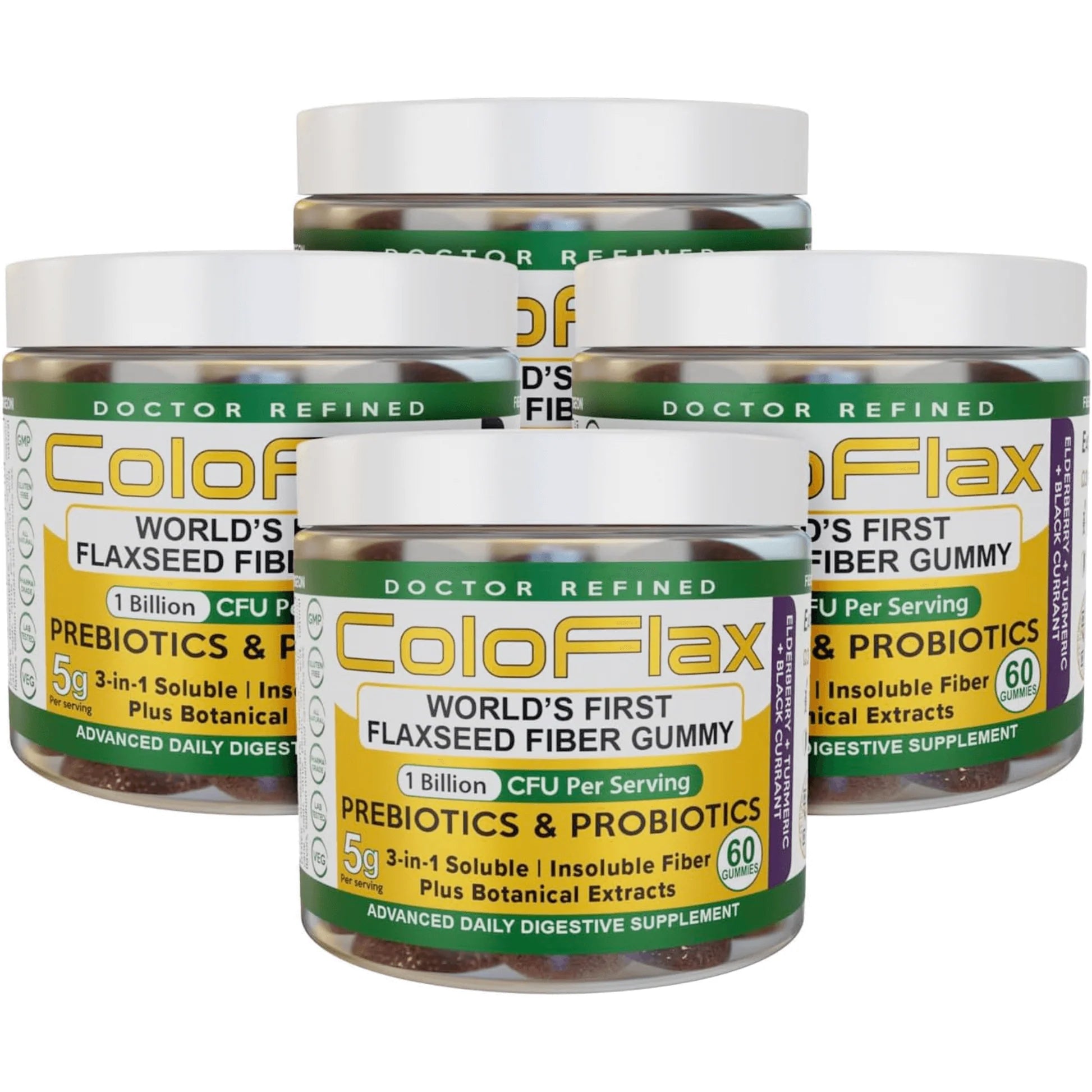Fiber is essential yet often overlooked, with as many as 95% of Americans not meeting their recommended daily intake. You can get your fill of fiber by adding beans, pulses, fruits, and vegetables to your diet, but if you’re still struggling to meet your targets, supplementation can help.
Fiber supplements are often dismissed as little more than laxatives, but while they can make you more regular, that’s not their only goal. Consuming a daily fiber supplement is just as important as taking a multivitamin, if not more so.
The question is…what are the best fiber supplements?
COLOFLAX
COLOFLAX is a leading digestive supplement that can support overall gut health, while also assisting with your cardiovascular health. It contains a blend of fiber, probiotics, prebiotics, and fatty acids, all of which work synergistically for the benefit of your digestive health.
As the name suggests, one of the key ingredients is lignan-rich flaxseed. Lignans are a type of antioxidant that has been linked to a host of health benefits, and flaxseed is the best source of these compounds.
COLOFLAX also contains inulin (see below) and arabinogalactan, a type of prebiotic fiber that has been studied for its immune-supporting benefits. This natural, starch-like compound ferments in the gut and produces healthy bacteria that could support an array of health processes. (1)(2)
By combining soluble and insoluble fiber, along with a host of complementary ingredients, COLOFLAX is arguably more effective than any other supplement on the market.
Psyllium Husk
Psyllium husk is an amazing substance, but it’s one that few people truly understand.
You’ll often see flavored psyllium husk in sachets and tubs, where it is combined with flavorings, branded as a “bulk-forming laxative”, and given a glossy brand name. But you can also just buy unbranded psyllium and save yourself a lot of money—it’s basically the same thing.
So, what is psyllium husk?
As the name suggests, it comes from the husk of the psyllium seed (Plantago ovata), also known as desert Indianwheat, blond plantain, and ispaghula. The seed husk is indigestible and soluble, and this is where its unique benefits derive.
Psyllium is consumed by adding the powdered husks to water and then drinking the mixture quickly. It forms a gel plug in the gut and, providing you remain hydrated, this gel will move through the colon and form large, healthy stools.
Psyllium is also a prebiotic, which means it helps to stimulate healthy bacterial growth in the gut.
What are the Benefits of Psyllium Husk?
At its most basic level, psyllium husk is basically just a type of soluble fiber that you consume as needed throughout the day. By increasing your soluble fiber intake, you can reduce the risk of heart disease, bowel cancer, and many other chronic conditions. It can also make you more regular, potentially limiting the frequency of constipation and other intestinal issues.
As psyllium works by drawing liquid into the colon, it could also help to balance blood sugar levels and make you feel fuller for longer.
How Much Psyllium Do I Need?
Psyllium is designed to be taken every day for periods of several weeks. It can be added to your daily supplement regime.
It’s always best to get your fiber from food where you can, but if you’re struggling to do that and psyllium husk works for you, there should be no harm in taking it daily.
Most positive research has been conducted on doses of between 3.5 and 8 grams a day. Many psyllium husk sachets contain 3.5 grams, giving you the lower end of this range and advising you to take it once or twice a day as needed.
If you are taking psyllium husk for the first time and typically have a very low fiber diet, we recommend starting with just 3.5 grams a day and then assessing tolerance. It’s just fiber, so it’s safe, but introducing large amounts of fiber to your diet in a short space of time could lead to uncomfortable bloating, gas, and abdominal cramping.
What are the Dangers of Psyllium Husk?
Although psyllium is very safe when used properly, it can cause serious problems if it’s abused or misused.
For instance, if you take several sachets of psyllium at once and don’t consume a lot of liquid, the psyllium will move slowly through your gut and may form hard clumps. This can lead to bouts of constipation, and if you’re using it to fix such issues, you may find yourself worse than when you started.
In extreme cases, it could cause intestinal blockages.
Use psyllium husk sparingly, pay attention to your gut, and contact a healthcare professional if you experience severe constipation, rectal bleeding, abdominal pain, or excessive bloating.
Is Psyllium Husk Gluten Free?
Psyllium husk is naturally gluten-free, so it is safe for coeliacs to consume. It is actually used in some commercial gluten-free baked goods and is also recommended as a low-calorie GF alternative.
Is Psyllium Husk Good for Diarrhea?
Surprisingly, psyllium husk works just as well for diarrhea as it does for constipation. It slows the transit of waste through the gut and creates bulkier stools.
Inulin
Inulin is a prebiotic soluble fiber that can be found in thousands of plants, including chicory root, garlic, wheat, Jerusalem artichoke, and barley. It’s also added to everything from protein bars to yogurt and drinks, where it is used to replace fat and sugar while also altering the texture.
As a fiber supplement, inulin can help to relieve the symptoms of constipation, improve gut health, and even promote weight loss.
If using inulin, start with very small amounts and look out for side effects such as bloating, gas, and loose stools. These are common when a new fiber is added to your diet, but if they are excessive and painful, you should stop taking the supplement and seek medical advice.
Refrain from using large quantities of inulin unless you have been advised to do so by your doctor.
Is Inulin Good For You?
Inulin can be very good for you. As with psyllium husk, many of the benefits derive from the introduction of fiber, which can improve your overall digestive health while also impacting your cardiovascular system. It never hurts to have a little extra fiber in your diet and it’s something that the vast majority of Americans can benefit from.
What is Inulin Made From?
Inulin is found in many plants, and so it has a natural source. Most of the inulin used in the supplement industry is sourced from chicory root. You can actually buy chicory root powder instead of inulin. In such cases, make sure you check the label for the dosage recommendations as they will differ from inulin powder.
Why is Inulin Added to Stevia?
If you check the back of stevia packets and containers, you’ll notice that they often include inulin. It’s used as a thickener and it’s believed that it helps to improve the taste, consistency, and overall quality of the product.
How Much Inulin Should I Take?
The average starting dose for inulin supplements is between 2 and 3g per day for 2 weeks. From there, it can be increased to between 5 and 10g a day if there are no uncomfortable side effects.
Many of the studies that have highlighted the benefits of inulin have used doses of between 10 and 30g a day. This is a lot of fiber to consume in supplement form, so we don’t recommend consuming anywhere near this amount unless directed to do so.
Methylcellulose
Methylcellulose is produced by chemically treating cellulose, which is derived from plants. When added to water, methylcellulose works a lot like psyllium in that it forms into a gel, absorbs water, and moves slowly through the gut.
Methylcellulose dissolves easily in water and can also be consumed in pill form. It’s usually easy to swallow and is available in more palatable concoctions than psyllium.
The main difference between methylcellulose and psyllium is that the latter is partially fermented in the gut, which can lead to gas and cramping, whereas methylcellulose is not fermentable. This doesn’t make much of a difference for the average user, but if you find that you can’t tolerate psyllium due to gas, bloating, and general discomfort, you may be better suited to methylcellulose.
It's worth noting, however, that many patients experience little to no issues when using psyllium husk, and some studies have reported no difference in side effects when comparing methylcellulose to psyllium.
Is Methylcellulose Used in Food?
Yes, methylcellulose is often used as a thickening agent in food. You’ll find it in bread, ice cream, cakes, and many other foods. More controversially, methylcellulose is added to processed foods as a way of bulking them up and making them seem more substantial than they actually are.
It is used in very small amounts, though, so you won’t get much of a laxative effect.
Is Methylcellulose Natural?
You could be forgiven for thinking that methylcellulose was natural, considering it is derived from a plant-based ingredient. But it’s not. Methylcellulose is created using a complex refining process, one that is far from natural.
If you’re worried about this, you should stick with psyllium husk or inulin instead.
Is Methylcellulose Vegan?
Yes, methylcellulose is 100% vegan and is actually used as an alternative to gelatin in some vegan and vegetarian foods. For instance, you’ll find methylcellulose in a number of vegan burgers, including Beyond Meat, where it is used alongside potato starch to bind the burger patties together.
Is Methylcellulose Safe to Eat?
Methylcellulose has been approved by the US Food and Drug Administration (FDA), as well as the European Food Safety Authority (EFSA). It is not toxic and it is not an allergen. It’s not even digestible, as it moves straight through the gut, which is why it’s so effective in the first place.
It’s perfectly safe to eat and use as a supplement, but as with any supplement, you should monitor your reactions and stop if you notice any issues.
Summary: The Best Fiber Supplements
All of the above supplements can bump up your fiber intake and improve your digestive health. If you suffer from occasional constipation, bloating, and general sluggishness, they could help. What’s more, meeting your daily fiber needs could drastically reduce your risk of developing a host of chronic diseases, including heart disease and colon cancer.
If you’re suffering from chronic constipation and passing hard, dry, and even bloodied stools, contact a healthcare professional before using one of the above supplements. You may have an intestinal blockage or another serious underlying cause that needs to be dealt with.
Fiber supplements are designed to promote regularity and keep your digestive system healthy. They are not laxatives and can’t replace sound medical advice.






